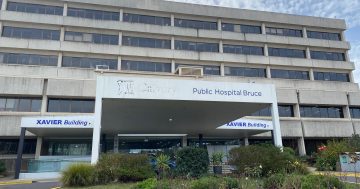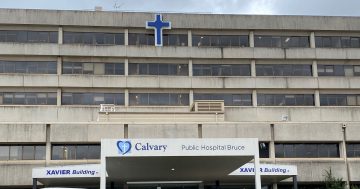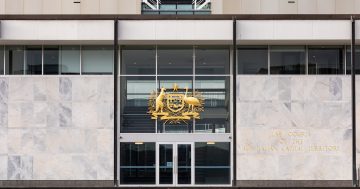
The Calvary name may have been removed from the North Canberra Hospital, but concerns around its compulsory acquisition remain. Photo: Thomas Lucraft.
As a Commonwealth inquiry considers passing a Bill that would force the ACT Government to hold an inquiry into the compulsory acquisition of North Canberra Hospital, several concerns have been raised that this is a threat to Territory rights.
ACT Independent Senator David Pocock has previously accused the Federal Coalition and Greens of setting up a Senate inquiry by “stealth” in order to meddle in Territory business.
It appears many agree with the stance the Commonwealth shouldn’t be interfering with Territory business – however, they’re also concerned proper processes still weren’t followed.
One such voice is former Australian Public Service Commissioner Andrew Podger AO.
The ANU Honorary Professor of Public Policy submitted he felt it wasn’t appropriate for the Commonwealth to get involved in this way.
However, he was concerned with how the entire acquisition process came about given it appeared consultation didn’t occur at a Federal level, despite health being a responsibility of both levels of government.
He questioned the ACT Government’s guarantees the acquisition would result in improved ambulance services and emergency department management, and warned the government’s treatment of its original contract with Calvary Health Care could lead to longer-term consequences.
“If ever there was an example of poor public policy processes, this would have to be it,” Hon Prof Podger submitted.
“One wonders whether the ACT Government’s longevity contributed to this abuse of good processes including proper evaluation and careful consideration.
“In the absence of due process, it is not possible to determine with certainty that the decision is justified, and there is every reason to suspect the risks of failing to achieve claimed benefits are high.”
Calvary Health Care had launched a legal challenge against the acquisition legislation and regulation when it first passed.
The ACT Supreme Court found the legislation was valid, and Calvary later abandoned its case against the regulation.
In its submission to the Federal inquiry, Calvary stated it was concerned the Territory’s decision to abandon usual legislative processes gave rise to “broader sovereign risk issues”.
“Calvary considers the Territory’s conduct as grossly unfair and unprecedented,” it submitted.
“It is clear to Calvary that the acquisition and transition have proceeded under a cloud of manufactured agency … These events create a dangerous precedent for departure from usual parliamentary scrutiny and due process.”
That’s in contrast to the ACT Government’s submission, as it felt the Legislative Assembly had enough mechanisms in place to ensure scrutiny of both executive decisions and legislation.
“The Self-Government Amendment Bill ignores existing mechanisms for deliberation, accountability, transparency and debate that have operated as intended,” it submitted.
The ACT Government stated it felt the Federal Bill was an “inappropriate and unnecessary” attempt to interfere with Territory concerns.
“It sets a dangerous precedent in that it seeks to again interfere in the Legislative Assembly of the ACT’s democratic right to make laws appropriate for its community,” it stated.
“This is particularly egregious when it comes so soon after Territory rights were restored.”
The ACT Government attracted severe criticism for its decision to pass the Health Infrastructure Enabling Bill and its associated regulation without the usual debate processes.
The legislation did go before the Standing Committee on Justice and Community Safety, which has a legislative scrutiny role, while the Health and Community Wellbeing Committee chose to instead receive briefings rather than conduct its own inquiry.
The bill was referred to the Public Accounts Committee, which also chose not to undertake an inquiry – much to the disgust of its chair.
Two advocacy groups have stated they believe the ACT has appropriate scrutiny mechanisms, and it’s now just time to get on with the job.
The Health Care Consumers’ Association (HCCA) noted while some of its members had issues with the acquisition, it was concerned the potential bill has not been designed to probe the appropriateness of the decision-making process around the acquisition.
“In any case, it is an ACT matter. Any inquiry should be initiated by the ACT,” it submitted.
“[The Bill] has the potential to set a precedent for interstate senators (not elected by the people of the ACT), or the Commonwealth more generally, to interfere in ACT Government issues.”
While the Australian Salaried Medical Officers Federation (ASMOF) said, if passed, the Federal Bill would place further strain on an “already fractured” healthcare workforce.
“The resources any ‘inquiry’ would require can be better allocated towards improving the working conditions and culture within Canberra’s public hospitals,” it submitted.
The Federal Senate inquiry is due to hand down its report on Wednesday (9 August).





















